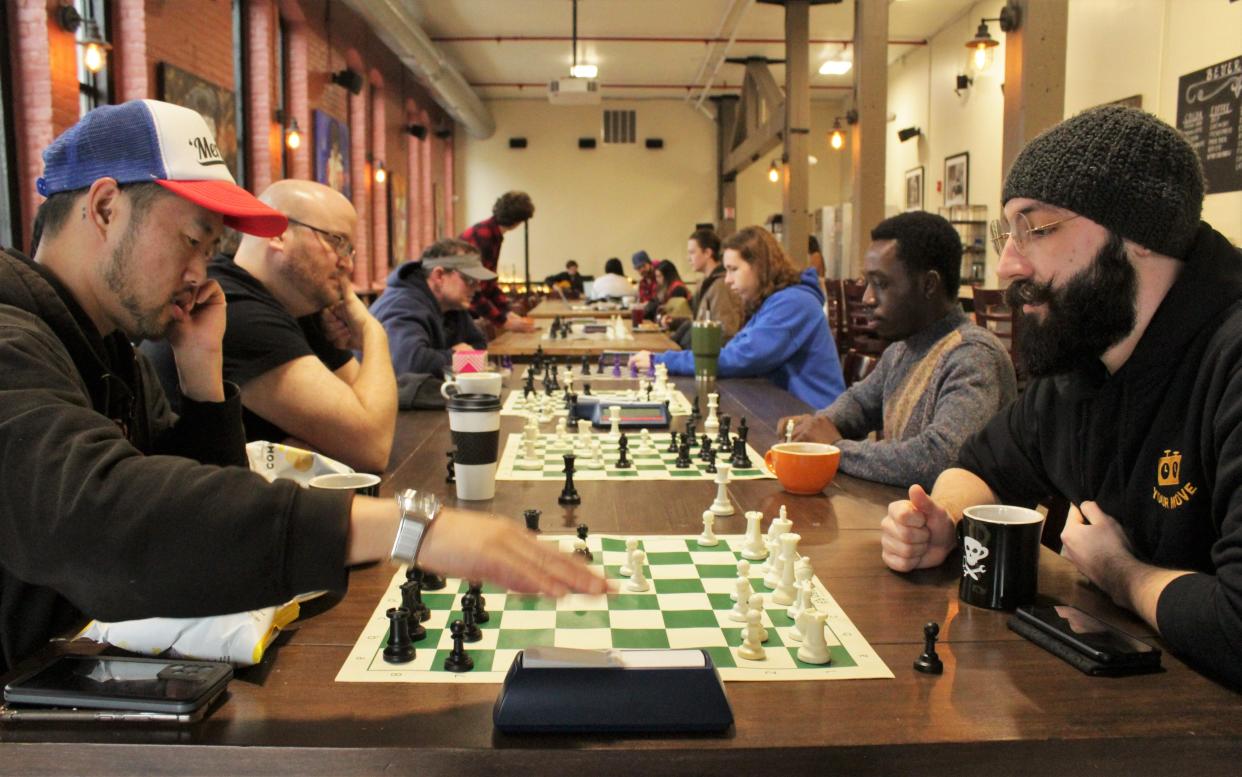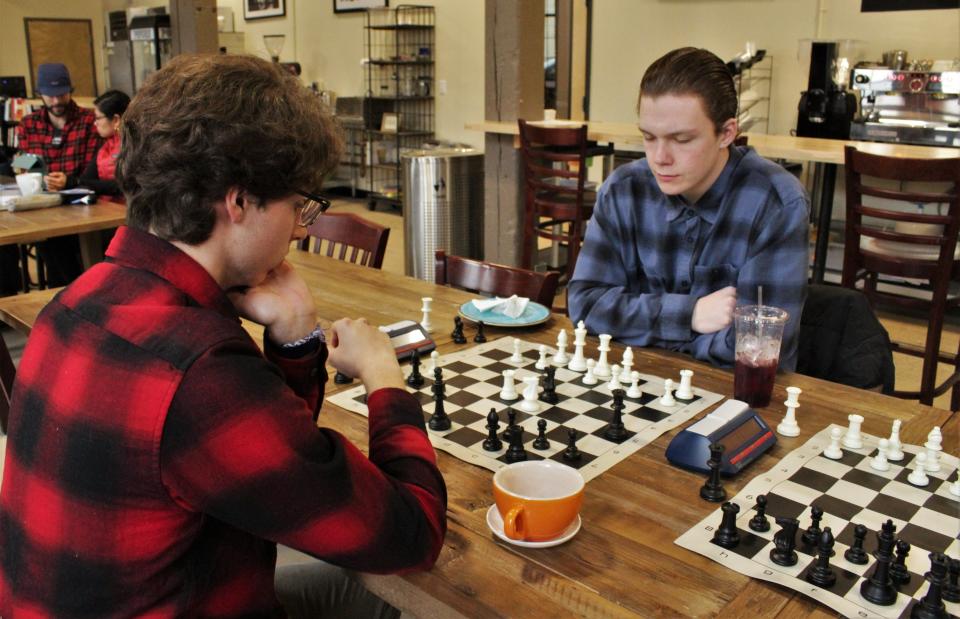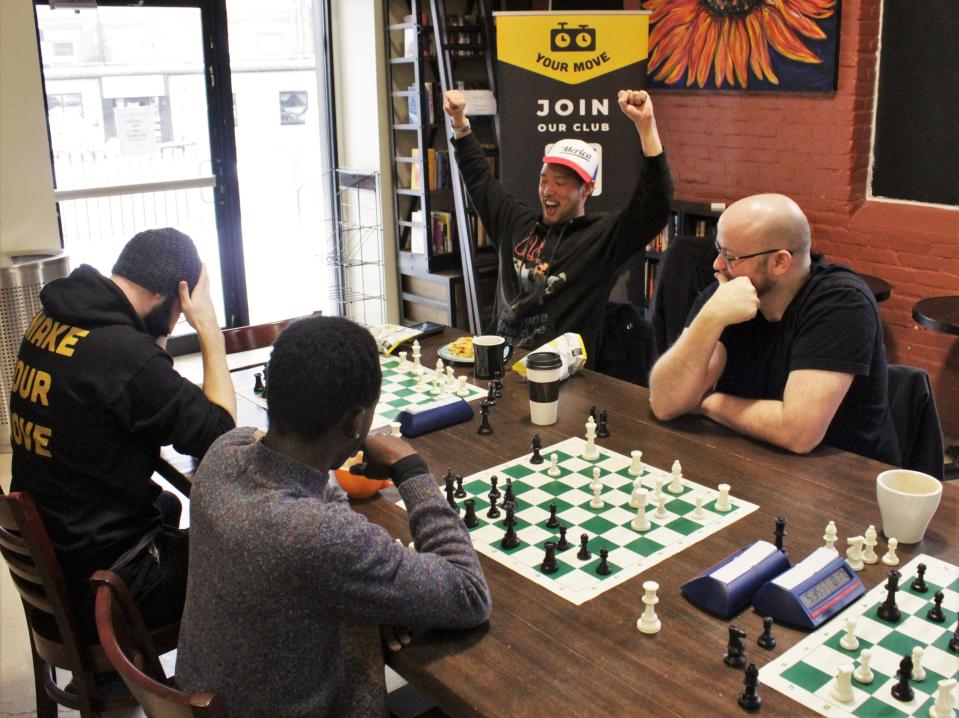'Making chess less intimidating': Worcester club draws a community of all levels of players

- Oops!Something went wrong.Please try again later.
WORCESTER — Typically, to play the game of chess, one has to bring in a sense of competition, strong logic and serious mental preparation.
At Your Move, a local chess club that meets Sundays at a Worcester café, none of those are obligatory — having fun, learning chess and becoming part of a community are.
Dustin Hopkins, a Princeton-based web designer who established Your Move in February of last year under the previous name Kingside Development Chess Club, said the club welcomes players of all levels.
Held in the back room of Acoustic Java, a café at the foot of an 1889 red-brick building on 6 Brussels St. behind the former building of Rotmans Furniture, Your Move draws an average of 20 members per week.
“On the minimal end, (it brings) something to do on a Sunday,” said Hopkins. “On the more dedicated end, it gives some consistency to the week as it becomes a practice of something that you stay dedicated to.
“Chess is an old game, and it's probably going to be here a lot longer than any of us. To have a point in the week where you're practicing something for the rest of your life, it brings a lot of patience to everywhere else.”
It started with an encounter
Just like the cascading sequences that move through a chess player’s mind, the story of Your Move was the result of an encounter that started with Hopkins meeting Jerry Williams, a Quinsigamond Community College art professor who was known to play chess in the community as a means of teaching and constructive conversation.
Williams, who passed away in 2019 at 69 years old, had been involved in chess as a way out of drug and alcohol addiction in the early 1980s, according to those who knew him.

To him, chess was a way to connect with anyone, no matter their age or background, said his wife Ramona.
“He loved playing with children especially,” said Ramona. “He would carry a small chess set in his pocket that would come out the moment he encountered someone who would want to play.”
She added that Williams would often go to local addiction recovery centers, where he would share his experience with chess as a way out of addiction, given the demanding focus that the game requires.
Hoping for someone to sit and play
At Everyday Miracles, an addiction recovery center on Pleasant Street, Williams was often seen sitting by himself with a chess board, reading, hoping to have someone sit and play.
The goal was to help those at the center in their recovery, not to show off his skill, as told by Program Director Michael Earielo, who often sat through Williams’ games.
“He loved playing people who were early in recovery and would need a boost of confidence about themselves,” said Earielo. “He would say to them, ‘We’re pawns that are made to believe we’re useless, but a pawn has so much potential. It can become a queen even, the most powerful piece on the board.'
“A very patient, kindhearted man.”
Meeting Williams for first time
It was at a clubs’ fair at Quinsigamond that Hopkins ran into Williams for the first time, seeing him sitting with four chessboards, looking to play a “simul” — a game in which one person plays many people at once.
Hopkins was a passerby who had played chess before in lessons given to him by his stepfather, but saw his game elevate greatly starting with that first encounter with Williams, whose chess skills often preceded him.

An engineering student at QCC, Hopkins split his time between classes, studying and attending the school's chess club, which was organized by Williams.
Hopkins eventually rose to the role of club president, which he said was as high a student could reach under Williams’ direction.
After graduation, Hopkins met Williams only once more, shortly before his passing at Everyday Miracles, where Hopkins worked for a nonprofit company.
The natural thing for the two friends to do was to break out a chess board and play a few games.
“We played three games,” said Hopkins. “He killed me.
“Your Move is Jerry's club in a way."
Hopkins himself had attended more seasoned chess clubs such as the MetroWest Chess Club and Greater Worcester Chess Club, but after the clubs closed during the pandemic, he looked around for another one.
It just so happened, that he would establish his own.
Coffee stop at Acoustic Java
On a coffee stop at Acoustic Java at 6 Brussels St. one morning, Hopkins stumbled upon the backroom of the coffee shop, where wooden picnic tables run the length of the room.
With chess always on his mind, it was only natural for Hopkins to suggest to the owner, David Fullerton, the idea of a chess club.
Fullerton said that he jumped at the idea immediately. He now brings his three children every Sunday to play the other members.
“It’s good energy,” said Fullerton. “Also, chess and coffee are a good fit.”
Starting last February, the club started Sundays from 10 a.m. to 1 p.m., on clocks donated by the community and boards and sets donated and provided by the members.
Members are as young as 8 years old and as fresh to the game as it gets.
While the major pusher of the club is to teach members for their game to elevate, Hopkins said that the games can sometimes get competitive between stronger members, who often engage in trash talking.
“With respect!” insisted Hopkins with a laugh. “You’ve got to respect the opponent.”
For Jason Karby and his 8-year-old son, Acoustic Java was the usual coffee place where they would spend Sunday mornings. After stumbling across an active session of the club at the café, they signed up right away.
“I'm not interested in chess, but my son was like, ‘I want to learn,’” said Karby. “(Hopkins) was like, ‘Hey, I'll teach you.’
“This club is huge and amazing for the city. We've met awesome people from all over the city, from all age groups who play here. It’s been great.”
Hopkins said he hopes the club draws more attention, especially after the club became an affiliate of Chess.com, a website with almost 120 million users including Grandmasters – professional players with the highest title in the world of chess.
For more daring members, Bob Secino of Shrewsbury, a National Master who got the lifelong title in 1990, also makes himself available at the club as a regular member.
Usually seen observant of the games with a coffee mug in his hand, he said the club brings “a lot of fun.
“I love the fact that this club is right across from (The College of) Holy Cross, drawing a younger crowd,” said Secino. “Chess is just a wonderful activity. It’s good for the mind, it’s good for the competitive spirit and good for sociability.”
While membership is currently free, he said that with the Chess.com affiliation, the club could require payment for membership, but that is still in the works.
“What I'd like to do is to just give Worcester a chess scene,” said Hopkins. “I want to just let it grow organically and let the members figure out where they want to take it.
“Above all, we’re looking to make chess less intimidating.”
This article originally appeared on Telegram & Gazette: Your Move, a Worcester chess club meeting at Acoustic Java every Sunday morning

